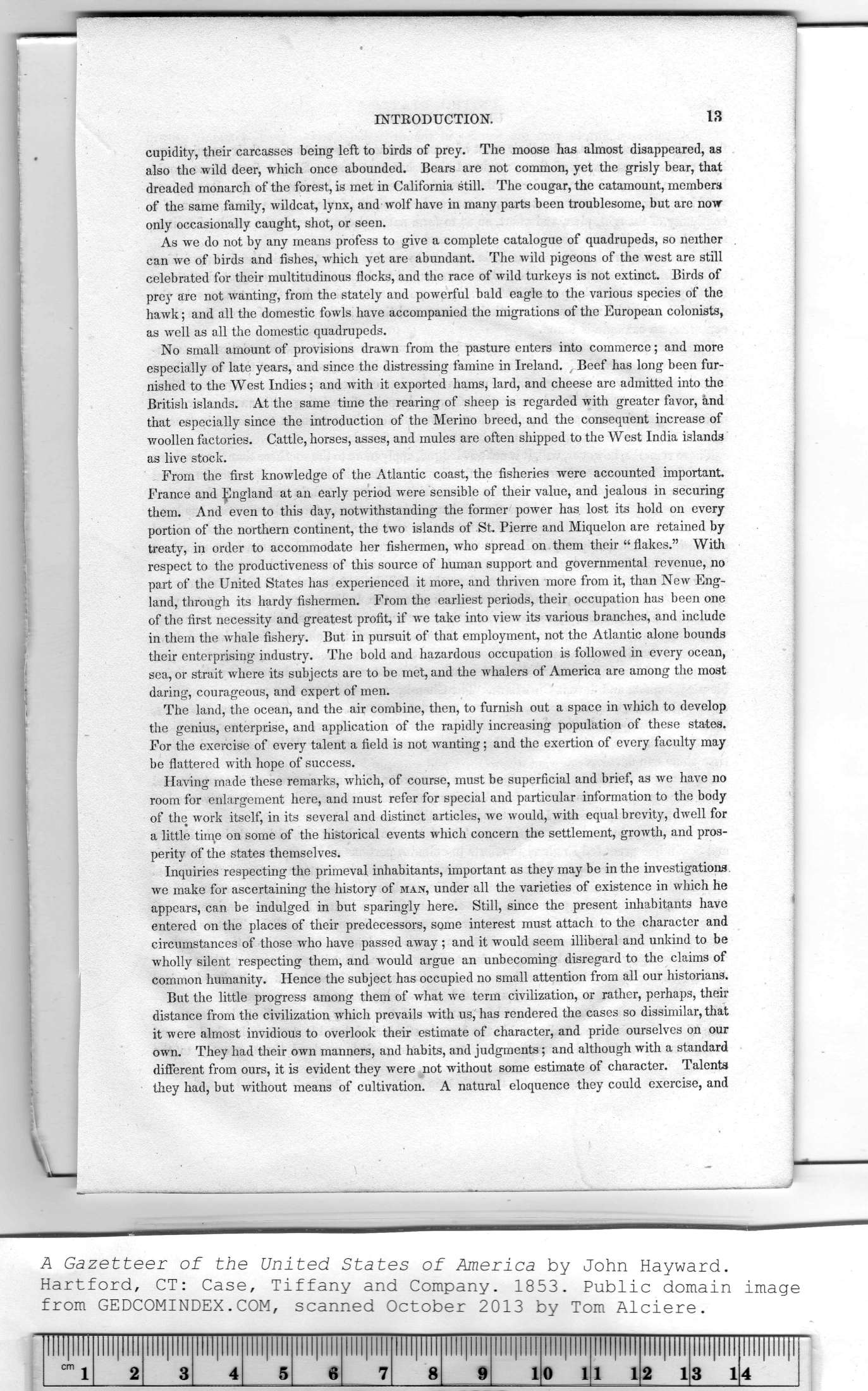|
|
Note: Ctrl and + increases the font size of the text below, Ctrl and - decreases it, and Ctrl and 0 resets it to default size.
INTRODUCTION. 13
cupidity, their carcasses being left to birds of prey. The moose has almost disappeared, as
also the wild deer, which once abounded. Bears are not common, yet the grisly bear, that
dreaded monarch of the forest, is met in California still. The cougar, the catamount, members
of the same family, wildcat, lynx, and wolf have in many parts been troublesome, but are now
only occasionally caught, shot, or seen.
As we do not by any means profess to give a complete catalogue of quadrupeds, so neither
can we of birds and fishes, which yet are abundant. The wild pigeons of the west are still
celebrated for their multitudinous flocks, and the race of wild turkeys is not extinct. Birds of
prey are not wanting, from the stately and powerful bald eagle to the various species of the
hawk; and all the domestic fowls have accompanied the migrations of the European colonists,
as well as all the domestic quadrupeds.
No small amount of provisions drawn from the pasture enters into commerce; and more
especially of late years, and since the distressing famine in Ireland. Beef has long been fur-
nished to the West Indies; and with it exported hams, lard, and cheese are admitted into the
British islands. At the same time the rearing of sheep is regarded with greater favor, and
that especially since the introduction of the Merino breed, and the consequent increase of
woollen factories. Cattle, horses, asses, and mules are often shipped to the West India islands
as live stock.
From the first knowledge of the Atlantic coast, the fisheries were accounted important.
France and England at an early period were sensible of their value, and jealous in securing
them. And even to this day, notwithstanding the former power has. lost its hold on every
portion of the northern continent, the two islands of St. Pierre and Miquelon are retained by
treaty, in order to accommodate her fishermen, who spread on them their “ flakes." With
respect to the productiveness of this source of human support and governmental revenue, no
part of the United States has experienced it more, and thriven more from it, than New Eng-
land, through its hardy fishermen. From the earliest periods, their occupation has been one
of the first necessity and greatest profit, if we take into view its various branches, and include
in them the whale fishery. But in pursuit of that employment, not the Atlantic alone bounds
their enterprising industry. The bold and hazardous occupation is followed in every ocean,
sea, or strait where its subjects are to be met, and the whalers of America are among the most
daring, courageous, and expert of men.
The land, the ocean, and the air combine, then, to furnish out a space in which to develop
the genius, enterprise, and application of the rapidly increasing population of these states.
For the exercise of every talent a field is not wanting; and the exertion of every faculty may
be flattered with hope of success.
Having made these remarks, which, of course, must be superficial and brief, as we have no
room for enlargement here, and must refer for special and particular information to the body
of the work itself, in its several and distinct articles, we would, with equal brevity, dwell for
a little time on some of the historical events which concern the settlement, growth, and pros-
perity of the states themselves.
Inquiries respecting the primeval inhabitants, important as they may be in the investigations,
we make for ascertaining the history of max, under all the varieties of existence in which he
appears, can be indulged in but sparingly here. Still, since the present inhabitants have
entered on the places of their predecessors, some interest must attach to the character and
circumstances of those who have passed away ; and it would seem illiberal and unkind to be
wholly silent respecting them, and would argue an unbecoming disregard to the claims of
common humanity. Hence the subject has occupied no small attention from all our historians.
But the little progress among them of what we term civilization, or rather, perhaps, their
distance from the civilization which prevails with us, has rendered the cases so dissimilar, that
it were almost invidious to overlook their estimate of character, and pride ourselves on our
own. They had their own manners, and habits, and judgments; and although with a standard
different from ours, it is evident they were not without some estimate of character. Talents
they had, but without means of cultivation. A natural eloquence they could exercise, and
|
lllllllll |
lllllllll |
lllllllll |
lllllllll |
lllllllll |
lllllllll |
lllllllll |
lllllllll |
llll|llll |
lllllllll |
lllllllll |
lllllllll |
TimilU'llpT |
lllllllllll |
|
cn i j |
2 |
3 |
4 |
5 |
6 |
7 |
8 |
9 |
1 |
0 1 |
1 1 |
2 13 1 |
4 |
|
